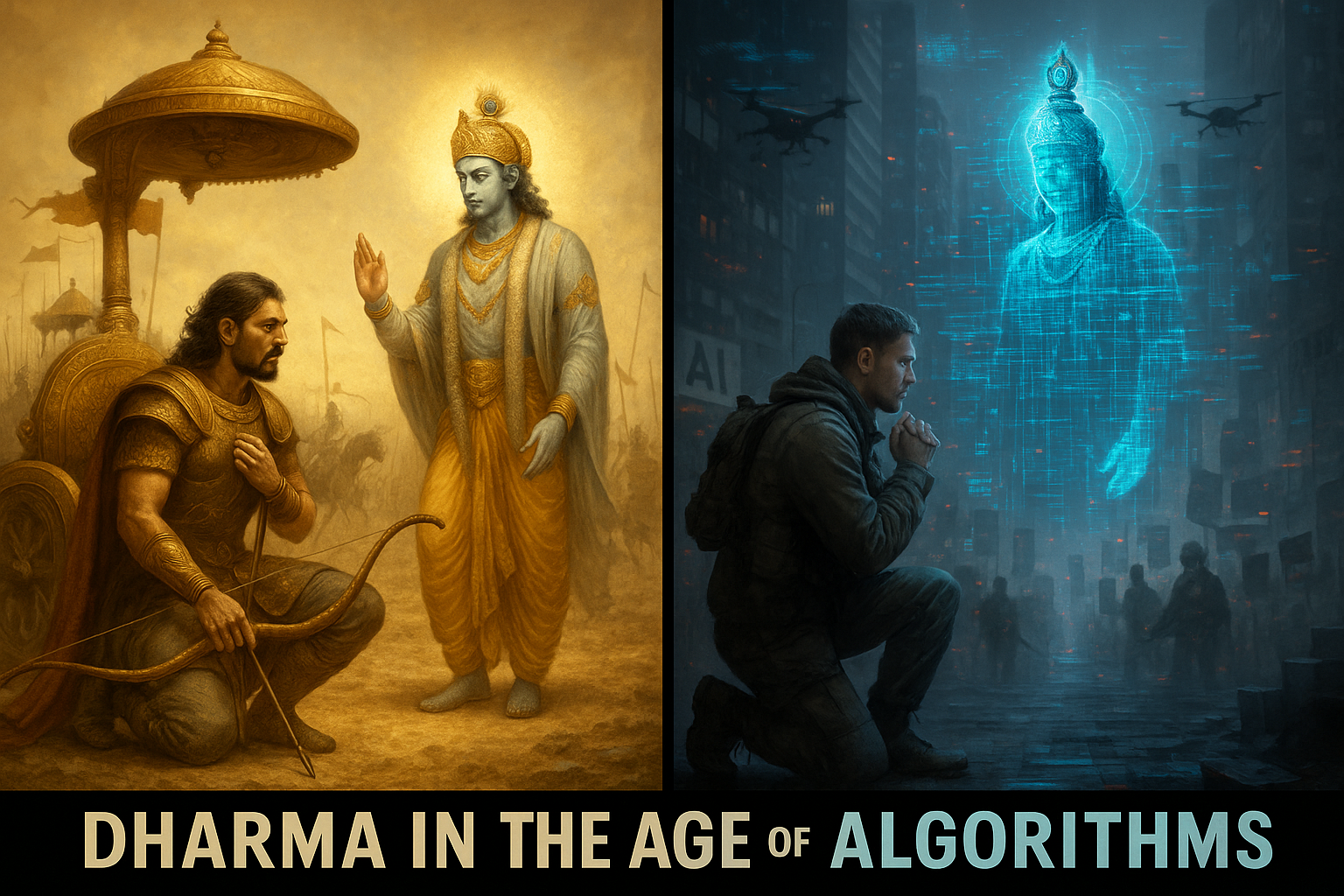Bhagavad Gita in the Age of AI and Anarchy

From Chariots to Cyberwar: Kurukshetra Never Ended
From Kurukshetra to Kaliyuga: Echoes of the Mahabharata in Today’s World
In an age of algorithms, nuclear arsenals, and ideological echo chambers, ancient epics may seem like distant tales. But look deeper and you'll find our world politically fractured, morally grey, and spiritually restless is not so different from the Mahabharata.
The battlefield has shifted from Kurukshetra’s dust to digital realms, economic rivalries, and cultural wars. But the core dilemmas of power, duty, betrayal, and righteousness remain eerily unchanged.
Politics: The New Kuru Court
The Mahabharata was never just about war it was about dharma, ambition, loyalty, and corruption.
Duryodhanas still roam our halls of power obsessed with control, exploiting systems for personal gain.
Shakunis whisper from behind in boardrooms, media outlets, or foreign lobbies, spinning webs of deceit.
Pandavas, though committed to justice, are often pushed into metaphorical exile sidelined for being inconvenient truth-bearers.
Today, just as then, truth is often inconvenient tested, twisted, and trampled until its cost can no longer be ignored.
Morality & Dharma: Still in Question
Krishna told Arjuna:
Yada yada hi dharmasya glanir bhavati Bharata,
Abhyutthanam adharmasya tadatmanam srjamy aham."
Whenever there is a decline in righteousness, and a rise in unrighteousness, I manifest Myself. (Bhagavad Gita 4.7)
The Mahabharata never offered simple answers and neither does our time. Today, we face dilemmas just as thorny:
- Is leaking state secrets dharma or betrayal?
- Is silence before injustice neutrality or cowardice?
- Is maintaining peace by hiding the truth a virtue or a trap?
These are the modern Kurukshetras quiet wars unfolding in our minds, courts, classrooms, and newsrooms.
The Inner Arjuna: The Struggle Within
Today, every thinking person is Arjuna torn, anxious, confused, asking:
Karpanya-dosopahata-svabhavah prcchami tvam dharma-sammudha-cetah"
With my being overwhelmed by the weakness of pity and my mind confused about dharma, I am asking you to tell me clearly what is best. (Bhagavad Gita 2.7)
In a world overloaded with information and contradictions, our inner Arjuna hesitates. Anxiety, depression, and purposelessness become the modern Gandiva too heavy to lift.
We need our inner Krishna be it spiritual clarity, a mentor, or conscience to guide us, reminding us of who we are, and what we must rise to become.
War Has Changed But Not Ended
Kurukshetra had chariots and bows. Today’s Mahabharata uses:
- Missiles, memes, media, and money.
- Economies weaponized.
- Cultures clashing.
- Civilizations questioning their very identity.
But as in the epic, no side remains untainted. Victory alone means nothing if it comes at the cost of dharma. Today’s conflicts, too, must ask not just who wins, but what remains after?
Hope: The Gita Still Whispers
Amidst the noise, the Bhagavad Gita, born in the heart of war, still whispers peace. It teaches us
- Clarity in confusion.
- Duty in despair.
- Action without ego.
- Purpose amidst chaos.
If each of us awakens the Krishna within the calm, the clarity, the conscience this age too can rise above darkness.
Conclusion: The Mahabharata — A Historical Mirror
The Mahabharata is not just a part of history or the distant past, it’s a reflection of the present. And perhaps, in this age of AI and anarchy, it is more relevant than ever.
Yada yada hi dharmasya glanir bhavati Bharata,
Abhyutthanam adharmasya tadatmanam srjamy aham." Whenever there is a decline in righteousness... I manifest. (Bhagavad Gita 4.7)
Maybe the divine isn’t waiting to descend anymore.
Maybe it is waiting to rise within each of us.